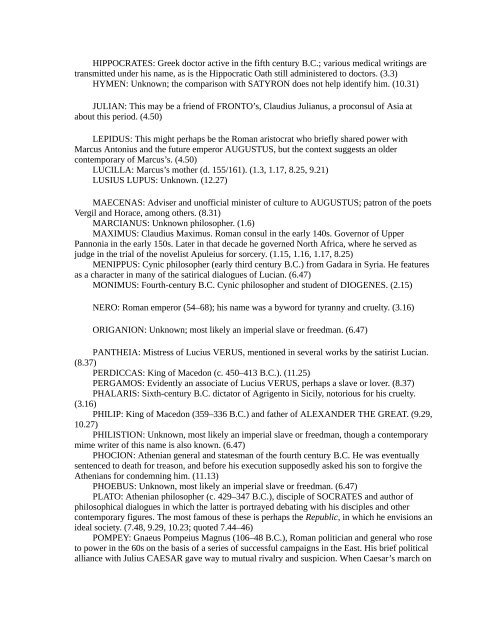9781945186240
You also want an ePaper? Increase the reach of your titles
YUMPU automatically turns print PDFs into web optimized ePapers that Google loves.
HIPPOCRATES: Greek doctor active in the fifth century B.C.; various medical writings are<br />
transmitted under his name, as is the Hippocratic Oath still administered to doctors. (3.3)<br />
HYMEN: Unknown; the comparison with SATYRON does not help identify him. (10.31)<br />
JULIAN: This may be a friend of FRONTO’s, Claudius Julianus, a proconsul of Asia at<br />
about this period. (4.50)<br />
LEPIDUS: This might perhaps be the Roman aristocrat who briefly shared power with<br />
Marcus Antonius and the future emperor AUGUSTUS, but the context suggests an older<br />
contemporary of Marcus’s. (4.50)<br />
LUCILLA: Marcus’s mother (d. 155/161). (1.3, 1.17, 8.25, 9.21)<br />
LUSIUS LUPUS: Unknown. (12.27)<br />
MAECENAS: Adviser and unofficial minister of culture to AUGUSTUS; patron of the poets<br />
Vergil and Horace, among others. (8.31)<br />
MARCIANUS: Unknown philosopher. (1.6)<br />
MAXIMUS: Claudius Maximus. Roman consul in the early 140s. Governor of Upper<br />
Pannonia in the early 150s. Later in that decade he governed North Africa, where he served as<br />
judge in the trial of the novelist Apuleius for sorcery. (1.15, 1.16, 1.17, 8.25)<br />
MENIPPUS: Cynic philosopher (early third century B.C.) from Gadara in Syria. He features<br />
as a character in many of the satirical dialogues of Lucian. (6.47)<br />
MONIMUS: Fourth-century B.C. Cynic philosopher and student of DIOGENES. (2.15)<br />
NERO: Roman emperor (54–68); his name was a byword for tyranny and cruelty. (3.16)<br />
ORIGANION: Unknown; most likely an imperial slave or freedman. (6.47)<br />
PANTHEIA: Mistress of Lucius VERUS, mentioned in several works by the satirist Lucian.<br />
(8.37)<br />
PERDICCAS: King of Macedon (c. 450–413 B.C.). (11.25)<br />
PERGAMOS: Evidently an associate of Lucius VERUS, perhaps a slave or lover. (8.37)<br />
PHALARIS: Sixth-century B.C. dictator of Agrigento in Sicily, notorious for his cruelty.<br />
(3.16)<br />
PHILIP: King of Macedon (359–336 B.C.) and father of ALEXANDER THE GREAT. (9.29,<br />
10.27)<br />
PHILISTION: Unknown, most likely an imperial slave or freedman, though a contemporary<br />
mime writer of this name is also known. (6.47)<br />
PHOCION: Athenian general and statesman of the fourth century B.C. He was eventually<br />
sentenced to death for treason, and before his execution supposedly asked his son to forgive the<br />
Athenians for condemning him. (11.13)<br />
PHOEBUS: Unknown, most likely an imperial slave or freedman. (6.47)<br />
PLATO: Athenian philosopher (c. 429–347 B.C.), disciple of SOCRATES and author of<br />
philosophical dialogues in which the latter is portrayed debating with his disciples and other<br />
contemporary figures. The most famous of these is perhaps the Republic, in which he envisions an<br />
ideal society. (7.48, 9.29, 10.23; quoted 7.44–46)<br />
POMPEY: Gnaeus Pompeius Magnus (106–48 B.C.), Roman politician and general who rose<br />
to power in the 60s on the basis of a series of successful campaigns in the East. His brief political<br />
alliance with Julius CAESAR gave way to mutual rivalry and suspicion. When Caesar’s march on


